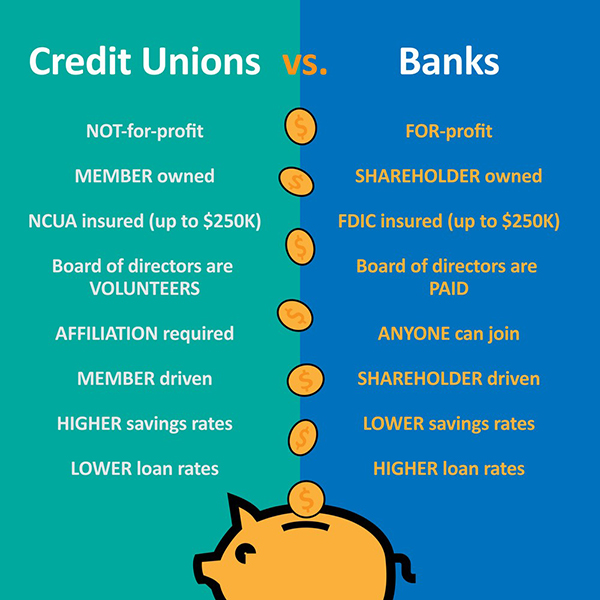Credit Unions and Banks: What's the difference?

Credit Unions and banks both have similar offerings but there are some important distinctions to make between these two types of institutions.
For-profit vs. Nonprofit
What makes banks and credit unions different from each other is their profit status. Banks are for-profit, and either privately owned or publicly traded, while credit unions are nonprofit institutions. This for-profit vs. not-for-profit divide is the main for the difference between the products and services each type of institution offers.
A credit union is a cooperative which means its owned by its members. Credit unions are built around members that share a common bond, such as the industry they are employed in, the community they live in, their faith, etc. In addition, as a nonprofit, credit unions are also generally exempt from federal taxes. This means credit unions do not have to worry about making profits for shareholders. It is the credit union’s mission to provide its members with the best terms it can afford for their financial products. This means members generally get lower rates on loans, pay fewer (and lower) fees and earn higher APYs on savings products than bank customers do.
Banks, on the other hand, are in business to make a profit, rather than focusing on the needs of account holders. This is one of the reasons why you will often find that banks charge more fees, and at a higher rate, than credit unions do. Interest rates on lending also tend to be higher at banks, while their APYs on savings products tend to be lower.

Why Choose a Credit Union?
As a cooperative financial institution, a credit union puts its members first which makes credit unions well-known for their personalized service. Members can generally expect to get personal attention and a commitment to getting their needs met. Additionally, your membership to a credit union is good for life, even if you leave the organization or community served by the credit union.
Credit unions also provide their members with necessary complementary financial education as part of their services. In addition to the types of online articles and tools that you can find on many banking websites, many credit unions also offer in-person seminars on important financial topics, such as managing credit cards, preventing identity theft, buying a home, planning for retirement or estate planning.
How does a credit union member see these benefits?
Any profits generated by a credit union are distributed to its members in one of two ways: through interest earned on their deposit accounts or through dividend checks.
In addition, the fact that credit unions are not-for-profit also means that they often have no minimum balance requirements, lower deposit requirements to open accounts and lower overdraft, non-sufficient fund and ATM fees. Finally, you are likely to receive lower interest rates on loans from a credit union, compared to a bank.
Source: Forbes
